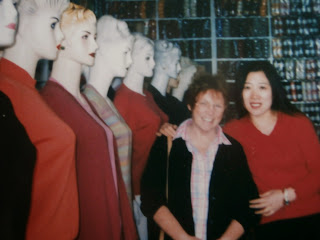Katharine and I had been warned before we left London that we should be sure to apply promptly for our residence and work permits as soon as possible after arriving in China. After three weeks we would be illegal workers and likely to be imprisoned.
When a month had gone by and nobody in the company had mentioned it, I decided to make enquiries. There were three main areas of formalities to complete : setting up a bank account; getting a medical check-up and registering as a 'foreign expert'.The extract below is about getting a photo in a hurry.
'A phone call came through to the office. What was to be a rocky relationship with the boss's second-in-command got off to a bad start.
‘Oh, hello Sheila, this is Jimmy Chai. Please excuse me for not contacting you sooner, but now it seems urgent that you register, and I must go to Beijing the day after tomorrow. Please report to my office with your passport and two photographs’ He didn’t apologise for previous neglect, which I was to discover was normal in the circumstances; to apologise for that would have admitted an error in procedure. He became irritated when I told him that I didn’t have a spare photo.
‘If I'd known, I would have got one’. I was a bit annoyed myself by this time.
‘In that case, you must downtown at once and have photographs taken – get ‘Express Rate’ He didn’t know the address of a photographers but it was agreed that I could take one of my colleagues with me.
‘Should I ask Rui Lao Shi for permission?' My office supervisor might object to my disappearance. Jimmy picked up the phone and explained there and then to Rui.
This, I discovered, was a regular pattern, which I thought at first may have been just Jimmy Chai’s management style or may have been a feature of the company , but which I eventually came to think of as a Chinese way of doing things. People were very reluctant to take responsibility or to act and tended to delay. Then, when it became apparent that something must be done, it was done in a great hurry, all obstacles brushed aside.
I was delivered by one of
the company cars to the photographic studio, accompanied by my young Chinese office
colleague, Lucy. There were lots of these shops in Tonghua, all well-stocked with costumes so clients could be photographed as geishas or cowboys against a suitable backdrop. When invited into a Chinese home it was quite usual to be offered a whole album of such photos to admire.
After the sprightly young man in charge got over his surprise at having a foreigner to deal with, we followed him upstairs to a bare studio. A stool had been placed in front of a
screen, with two white umbrellas and spotlights in front. In the dark beyond
the umbrellas was a camera on a tripod, but first I had to put on a black
sweater and take off my glasses.
‘Wo xiao yi xiao, ma?’ (Should I
smile?
‘Bu yong’ (‘Not necessary’)
I came away with eight identical
stills of someone who resembled an extra from ‘Bicycle Thieves’, listed in the closing credits,
perhaps, as : ‘villain’s widowed mother’.
The upside was they only cost £2 and I got to
stroll round the shops with Lucy for an hour or so whilst they were being
developed. Tonghua stores stocked surprisingly stylish shoes and bags. I also inspected
ski-wear-style padded coats of padded down in of varying lengths suitable for
the Manchurian Winter, on sale at reduced prices.







